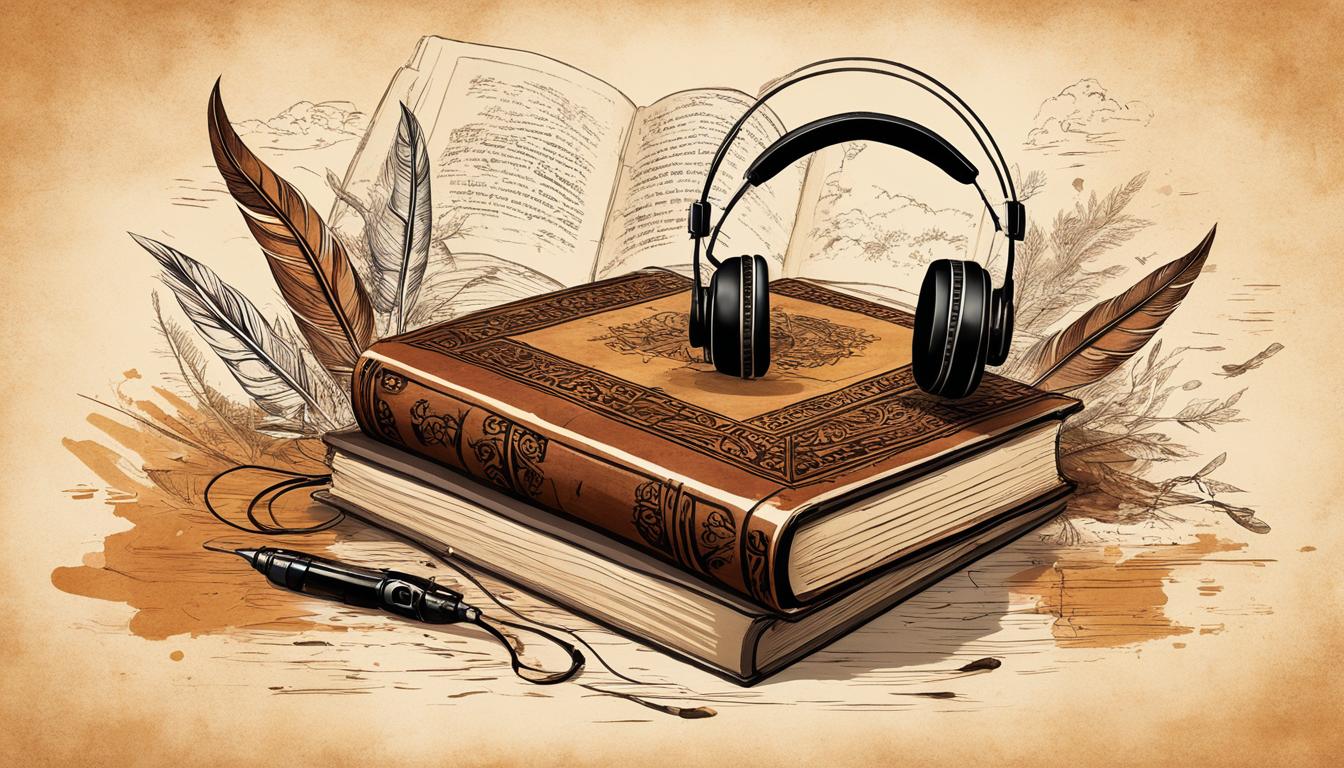Dive into an in-depth audiobook review of Geraldine Brooks’ acclaimed work, “People of the Book,” and embark on a literary journey that brings the past to resonant life. The compelling narration of this audiobook elevates the already masterful storytelling, immersing the listener in a tapestry of historical intrigue and human resilience. As readers traverse time and borders, they experience the gripping tales entwined within this Geraldine Brooks masterpiece, which is as meticulously researched as it is eloquently delivered.
Introducing “People of the Book”: A Literary Journey
Geraldine Brooks, a notable name in historical fiction, has captivated readers with her engrossing narrative artistry. Among her various works, “People of the Book” stands as a testament to her skill in crafting a compelling literary journey. This work intricately merges fact with fiction, taking the reader through time and across continents.
Overview of Geraldine Brooks’ Historical Fiction
Brooks’ prowess in this genre is evident in her meticulous research and ability to transport readers to past eras. Her characters are not just figures in time but vibrant voices that exemplify the human experience. “People of the Book” is no exception, with its rich backdrop of historical events forming the canvas upon which Brooks paints her story.
The Art of Weaving Fact with Fiction
The narrative artistry in “People of the Book” is a delicate dance between the real and the imagined. By interlacing true historical milestones with invented personal tales, Brooks brings a textured reality to her writing that resonates with readers. This harmonious blend serves not just to entertain but also to educate — providing a multifaceted view of history seldom found in textbooks.
Why “People of the Book” Stands Out
What sets “People of the Book” apart from other historical fiction is its deep reverence for the cultural artifacts and their stories. This novel, in particular, shines a light on the endurance of humanity’s artistic and written works, surviving against all odds. Through Brooks’ eyes, we see the enduring impact of these works on a personal and collective level, making “People of the Book” a standout piece in her oeuvre and within the literary world.
Unpacking the Story: Plot and Character Analysis
Geraldine Brooks’ “People of the Book” offers a rich tapestry of character development and plot structure, providing an intricate narrative analysis. Diving into the narrative, we examine both the historical timeline and the fictional intertwining to reveal the mechanics of Brooks’ storytelling.
Please find below, a detailed table outlining the core components of plot development and character growth that contribute to the overall impact of “People of the Book”. The complexity of the characters is matched by the intricacy of the plot, where each serves to reinforce and illuminate the other.
| Plot Element | Character Implication |
|---|---|
| Introduction of Historical Artefact | Establishes protagonist’s connection to a larger historical narrative |
| Multi-Timeline Narrative | Each era features characters faced with moral dilemmas reflective of their time |
| Flashbacks & Revelations | Characters’ backstories enrich the current narrative with depth and motivation |
| Convergence of Storylines | Character decisions in the past directly affect those in the present |
| Climactic Conflicts | Decisions under pressure showcase character evolution and resilience |
| Resolution and Closure | Characters find a resolution, often linking past to present and offering hope |
The novel’s characters are tasked with not only navigating their own personal journeys but also serving as torchbearers of history. As we dissect the layers of storytelling, the interplay between character development and plot structure reveals Brooks’ masterful capacity to intertwine individual narratives into a larger human experience, echoing across time.
- Characters as vessels of history, showing personal growth
- Plot twists that provoke deep contemplation and conversation
- Use of historical context to elucidate characters’ motivations
In conclusion, “People of the Book” not only takes readers on a journey through history but also invites them into a profound exploration of its characters, making the experience both intellectually and emotionally resonant.
Historical Context: Understanding the Real Events Behind the Story
Delving into the tapestry of the past, “People of the Book” by Geraldine Brooks is enriched by the profound historical context it portrays. This intertwining of history and narrative opens a window to crucial events that have left an indelible mark on humanity, reflected in the pages of the revered Sarajevo Haggadah and the evolving dynamics of interfaith relations. Below, we explore the undercurrents of history that form the backbone of this gripping tale.

Expulsion of Jews from Spain and Its Impact
The Edict of Expulsion in 1492, which mandated the expulsion of Jews from Spain, echoes through centuries as a pivotal moment of diaspora and cultural upheaval. The edict not only scattered a people globally but also set in motion a narrative of resilience and preservation, themes that resonate within “People of the Book”.
The Role of the Sarajevo Haggadah in History
The Sarajevo Haggadah is more than a mere artifact; it is a vessel of survival and testimony to the resilience of human spirit. This medieval manuscript has weathered conquests, wars, and the vicissitudes of time, emerging as a symbol of endurance and hope, much like the characters in Brooks’ narrative.
Interfaith Relations Through the Ages
The novel sheds light on the complex tapestry of interfaith relations, exploring the interconnectedness of Jewish, Islamic, and Christian communities. By doing so, it mirrors the message of the Haggadah itself—a message of coexistence and shared humanity that has oscillated between harmony and conflict throughout history.
Critical Acclaim: Awards and Recognitions
The novel “People of the Book” has earned a prestigious place in contemporary literature, thanks to its award-winning status and the literary honors it has received. Its journey through the maze of critical scrutiny has led to substantial critical acclaim, marking it as a significant contribution to Geraldine Brooks’ body of work. Below is an overview of the accolades that have heralded this novel’s success.
| Award/Honor | Year | Category |
|---|---|---|
| Australian Book Industry Awards | 2008 | Literary Fiction Book of the Year |
| Indie Book Awards | 2008 | Book of the Year |
| Pulitzer Prize for Fiction | 2006 | Finalist (Previously for “March”) |
The above table reflects only a snapshot of the recognitions “People of the Book” has achieved. The impact of such distinctions has solidified its place not just on bookshelves, but in academic discussions and literary circles worldwide.
“A tour de force that delivers a reverberating lesson gleaned from history… Geraldine Brooks’ real accomplishment is in her fiction’s reach.”
This praise from a respected literary critic encapsulates the widespread appreciation for Brooks’ intricate storytelling and the immersive historical world she has shaped. The accolades reinforce the novel’s resonance with both critics and readers alike, signifying its undiminished relevance in discussions of historical and cultural significance.
The Audiobook Experience: How Narration Enhances the Tale
The transformative power of audiobook narration lies in its ability to elevate the written word into an immersive soundscape, transforming engaging storytelling into an art form that delights the senses. As we delve into the world of “People of the Book,” it’s crucial to understand how the distinct elements of narration and sound come together to enhance the literary experience.
Selecting the Right Voice for “People of the Book”
The selection of the narrator’s voice is a pivotal decision that can significantly influence the listener’s connection with the story. The chosen voice must embody the essence of the book and adapt to the varied tones and characters presented within the narrative. It is not just about a pleasing timbre but about a voice that understands and translates the book’s heart and soul for the listener.
The Role of Sound Design in Historical Audiobooks
In historical audiobooks, sound design plays a crucial role in constructing the period-specific atmosphere that can transport listeners through time. Authentic sound effects and ambient music layers work in synergy to create a rich, historically accurate aural setting. Such meticulous attention to detail ensures that the listener is not merely hearing a story but journeying through history itself.
How Audiobooks Can Improve Literary Comprehension
Audiobooks can act as a catalyst for literary comprehension, especially when complex narratives and language are involved. Listening to a skilled narrator articulate and emote the text can provide clarity and enhance retention of themes and symbolism in ways that are sometimes lost in reading. For many, this auditory experience helps to cement a deeper understanding of the literary work.
- Audiobooks allow for multitasking, enabling enjoyment of literature while engaged in other activities.
- For auditory learners, listening to an audiobook can facilitate better retention and comprehension of the material.
- Through tone and inflection, narrators can add layers of meaning to the text, enriching the listener’s interpretative experience.
The medium of audiobooks has proven itself to be more than just a convenience—it is a bridge to enhanced comprehension and a testament to the timeless nature of stories told aloud. With each chapter and verse given new life through voice, the legacy of “People of the Book” continues to resonate in the contemporary fabric of storytelling.
Audiobook Review: Analyzing Geraldine Brooks’ Masterpiece
The audiobook version of “People of the Book” offers a dynamic alternative to the printed page, immersing the listener in a rich auditory experience of Geraldine Brooks’ historical novel. A performance critique reveals that the narrator’s delivery is both evocative and engaging, with a distinctive ability to bring characters to life, which is central to audiobook effectiveness.
Narrative pacing is another critical factor in the audiobook realm, significantly affecting the listener’s engagement and comprehension. With “People of the Book,” the tempo is carefully modulated, corresponding seamlessly to the unfolding drama within Brooks’ intricate plot, indicating a well-curated pacing strategy.
| Performance Element | Listener Impact | Critique |
|---|---|---|
| Character Voices | Deepens engagement with character arcs | Distinct and consistent, enhancing the narrative’s believability |
| Emotional Resonance | Enhances empathy and connection to the story | Emotive narration amplifies the story’s poignant moments |
| Enunciation | Improves clarity and understanding | Clear and articulate, allowing for an inclusive listener experience |
| Pacing | Maintains interest and tension | Well-paced, adept at conveying urgency or reflection when required |
Overall production quality also plays a vital role in determining the audiobook’s success. Crisp, clear audio and consistent volume levels ensure that the audience can comfortably surrender to the storytelling without technical distractions.

In conclusion, the audiobook production of “People of the Book” stands as a testament to the potential for audiobooks to offer a compelling alternative to traditional reading. The narrator’s performance, coupled with a judicious narrative pace, ensures that listeners enjoy an engrossing experience of Geraldine Brooks’ literary masterpiece.
Cultural Significance: The Impact of “People of the Book” on Readers
The literary influence of “People of the Book” by Geraldine Brooks is undeniable, with its powerful narrative resonating deeply within the tapestry of modern literature. It goes beyond mere storytelling to leave a substantial cultural impact, where reader engagement is not just expected but inevitable. The novel invites individuals to traverse the boundaries of time and belief, fostering a unique connection with history, religion, and the human experience.
“People of the Book” has sparked conversations on topics ranging from historical introspection to the analysis of cultural narratives. Its literary influence is evident in the dialogues it generates, concerning the preservation of culture through the artifacts we cherish. Through the eyes of the protagonist, we see a microcosm of humanity’s enduring spirit, overlaid against the backdrop of historical turmoil.
The cultural impact of the book has given rise to a multitude of reader interpretations, each personally tailored, highlighting the novel’s capacity for engagement beyond the page. Engagement with the text has led to discussion groups, book clubs, and even academic forums, underscoring the novel’s strength as a tool for scholarly exploration and communal discourse.
| Theme Explored | Impact on Cultural Discourse | Effect on Reader Engagement |
|---|---|---|
| Preservation of Historical Artifacts | Encourages reflection on the importance of cultural heritage and its influence on identity | Sparks curiosity and invites readers to explore their own heritage |
| Interfaith Tolerance and Collaboration | Facilitates dialogue on cooperation and understanding between different faiths | Provokes thoughtful discussions on religious coexistence and shared histories |
| Women’s Role in History | Sheds light on the often underrepresented female perspective in historical narratives | Promotes a deepened appreciation for women’s contributions throughout history |
| Resilience in the Face of Adversity | Offers hope through examples of human endurance and adaptability during crises | Inspires readers with stories of perseverance and survival |
Books like “People of the Book” demonstrate the profound potential of literature to impact society—a testament to Geraldine Brooks’ ability to resonate with readers on multiple levels, blending the past with the pivotal issues of the present day.
Comparing Formats: Audiobook vs. Print Edition
When considering Geraldine Brooks’ “People of the Book,” readers are faced with a choice between diverse reading formats, each with distinct advantages. The decision between an audiobook versus print can significantly affect one’s literary journey, accessibility, and tactile experience. Analyzing these options helps readers tailor their experience to individual needs.
Accessibility and Convenience of Audiobooks
Audiobooks have revolutionized the reading experience by offering unmatched accessibility. Individuals who are visually impaired or are avid multitaskers find audiobook formats particularly beneficial. The ability to consume literature while commuting, exercising, or completing household chores exemplifies the convenience of this medium. Moreover, the digital nature of audiobooks ensures that they are readily available for download, eliminating the extra wait for physical delivery or a trip to the bookstore.
Print Books and the Joy of Tangible Reading
Despite the surge in digital reading, print books maintain a timeless charm. The tactile experience of turning pages, annotating margins, and the smell of ink on paper contribute to a sensory pleasure that many readers seek. Print books also offer a visual and physical reminder of one’s literary journey, populating bookshelves and serving as personal treasures and conversation starters.
Personalized Experience: Choosing the Best Format for You
Ultimately, the best format is a subjective choice that aligns with personal preferences and lifestyle. Some readers prefer the immersive and enriched listening experience that an audiobook provides, while others advocate for the hands-on interaction with print materials. It is essential to recognize one’s reading habits and environmental contexts to make an informed choice.
| Feature | Audiobook | Print Book |
|---|---|---|
| Portability | High (digital format) | Varies by size and weight |
| Accessibility | Instant access through devices | Physical acquisition required |
| Tactile Engagement | Minimal | High (physical interaction) |
| Convenience for Multitasking | Optimized for multitasking | Limited to dedicated reading time |
| Resale Value | Not applicable | Potential for resale or sharing |
| Annotation | Dependent on app features | Direct, personal notes on pages |
Each format offers a unique pathway to explore “People of the Book,” shaping the narrative’s impact through varying degrees of engagement and convenience. The dialogue between audiobook and print continues as evolving technologies and personal reading style preferences drive the future of literary consumption.
Conclusion
In the realm of historical literary works, “People of the Book” by Geraldine Brooks stands as a testament to the timeless relevance and power of storytelling. As we reach our final thoughts on this captivating audiobook, we see the threads of Geraldine Brooks’ narrative artistry converge into a reflective summary that not only honors the Sarajevo Haggadah’s storied past but also presents an intimate tapestry of human experience across epochs. The literary journey we embarked upon, guided by deft narration and meticulous attention to historical detail, leaves an indelible mark not just on our minds but also on the landscape of historical fiction.
From intricate character development to the profound exploration of the human condition during times of immense cultural and religious upheaval, Brooks has masterfully captured the essence of humanity’s enduring spirit. The audiobook medium has excellently amplified this experience, allowing listeners a hands-free immersion into the rich, complex world Brooks constructed. The vivid narration adds a layer of depth, animating the true events and fictionalized accounts that form the bedrock of this remarkable work.
As we close this review, we are reminded that the true power of “People of the Book” lies in its ability to foster a connection with the audience that transcends the printed page or spoken word. It has been a literary journey that has illuminated the path of historical narratives, enriching and engaging our understanding of the past. Geraldine Brooks has indeed woven a masterpiece, one that continues to resonate and capture the imaginations of readers and listeners, affirming its place among the notable chronicles of time.



